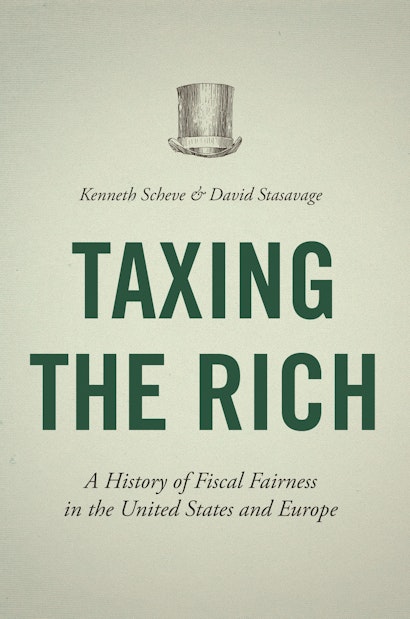In today’s social climate of acknowledged and growing inequality, why are there not greater efforts to tax the rich? In this wide-ranging and provocative book, Kenneth Scheve and David Stasavage ask when and why countries tax their wealthiest citizens—and their answers may surprise you.
Taxing the Rich draws on unparalleled evidence from twenty countries over the last two centuries to provide the broadest and most in-depth history of progressive taxation available. Scheve and Stasavage explore the intellectual and political debates surrounding the taxation of the wealthy while also providing the most detailed examination to date of when taxes have been levied against the rich and when they haven’t. Fairness in debates about taxing the rich has depended on different views of what it means to treat people as equals and whether taxing the rich advances or undermines this norm. Scheve and Stasavage argue that governments don’t tax the rich just because inequality is high or rising—they do it when people believe that such taxes compensate for the state unfairly privileging the wealthy. Progressive taxation saw its heyday in the twentieth century, when compensatory arguments for taxing the rich focused on unequal sacrifice in mass warfare. Today, as technology gives rise to wars of more limited mobilization, such arguments are no longer persuasive.
Taxing the Rich shows how the future of tax reform will depend on whether political and economic conditions allow for new compensatory arguments to be made.
Awards and Recognition
- One of Bloomberg’s Best Books of 2016
"These findings run counter to a popular narrative. Recall that in 2012, Mitt Romney said that in a democracy, a candidate who offers tax breaks to the less well-off at the expense of the rich will win mass support ‘no matter what.' That claim does not appear to be supported by the historical record."—Robert J. Shiller, New York Times
"In its big picture argument the book is convincing: on both the correlation and nature of causality between wars that required the mass of working people to sacrifice not just their labour but also their lives; and on the imposition of higher tax rates on the rich in the 20th century."—Torsten Bell, Prospect
"A sweeping look at the history of levies on the wealthy."—Hugo Greenhalgh, Financial Times
"[Scheve and Stasavage] flesh out their big picture with a mass of compelling evidence. Overall, an outstanding book."—Bryan Caplan, EconLog
"What is surprising about this book is how robustly the authors discount other widely held explanations for the gradual reduction in tax paid by the richest 1% since 1980. The influence of political lobbying, liberalised capital flows and the breakdown of the postwar consensus are, in their view, inadequate answers. What has changed is the focus of ‘equality of sacrifice,' which has returned to a debate about fairness."—Zac Tate, Capx
"Apart from anything else, the historical data on top tax rates is fascinating."—Diane Coyle, Enlightened Economist
"[A] fine and stimulating book."—Financial Post
"More than any other book I've read in the past few years, their arguments have prompted me to review what they wrote and look for other research that supports or counters their points."—David Cay Johnston, Tax Notes
"The authors make the force of the compensatory view clear. Judging by the apparent success of the rhetoric during the 2016 U.S. presidential primaries that speaks of a system rigged to favor the rich, the compensatory theory has not gone unnoticed by political strategists."—Michael Keen, Finance & Development
"[A] fine model of social science research."—Richard Cooper, Foreign Affairs
"Taxing the Richexplains why the problems of America's poor and angry are unlikely to be solved by redistributive taxation."—Angus Deaton, Bloomberg
"The authors have developed a data set that holds promise for the comparative international analysis of the taxation of the rich, especially during the two world wars of the twentieth century."—W. Elliot Brownlee, ANCH
"This book pulls together a vast array of evidence and develops a collection of compelling arguments that enhance our understanding of the prospects for redistributive taxation in modern economies. Drawing from a wealth of different country experiences, Taxing the Rich will appeal to a wide range of readers in economics and political science and inform current policy debates."—Timothy Besley, London School of Economics
"This is a fascinating book. In a comprehensive and accessible manner, Scheve and Stasavage trace the rise and fall of sharply progressive taxation of income and inheritance in America, Europe, and Japan over the past century. They stress the key role played by mass mobilization and compensatory claims and provide critical insights into the conditions that could lead to the return of high tax rates on the rich. A must-read."—Thomas Piketty, author of Capital in the Twenty-First Century
"Scheve and Stasavage provide a thoughtful historical and comparative perspective on the key question of why countries choose to impose high taxes on the rich. In this important and timely book, they elegantly challenge several common theories that seek to explain why countries increase taxes on the wealthy. Their findings nicely explain past tax treatment and provide a sobering prediction of future tax burdens for those at the top of the income and wealth distribution."—Eric M. Zolt, UCLA School of Law
"Why have the rich been spared greater taxation despite the massive rise in inequality that has occurred in advanced democracies in recent decades? This fascinating book provides a clear answer: governments tax the rich not to undo inequality, but to compensate for sacrifices being asked of the non-rich. Taxing the Rich is a model of social science research, firmly grounded in systematic data analysis as well as historical case studies."—Dani Rodrik, author of Economics Rules: The Rights and Wrongs of the Dismal Science
"This thought-provoking book combines historical erudition and statistical analysis to reinterpret the rise and fall of progressive taxation. It persuasively argues that mass wars gave rise to the 'conscription of wealth,' and it suggests that today's asymmetric crises are unlikely to generate broad support for more taxation of the rich."—Bernard Salanié, author of The Economics of Taxation
"Scheve and Stasavage provide an engaging analytical history of taxation of the rich in the United States, Canada, and Western Europe from 1800 to the present. There is no doubt in my mind that this terrific book will be widely read, cited, and discussed."—Jonas Pontusson, author of Inequality and Prosperity: Social Europe vs. Liberal America
"Taxing the Rich makes a provocative argument about an important topic."—Nolan McCarty, coauthor of Political Bubbles: Financial Crises and the Failure of American Democracy


